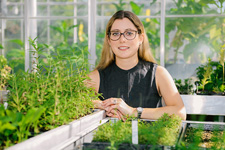Half of Western's Vanier winners are alumni
By Mark Wolfe

Four Western PhD candidates have been named among 166 nationwide recipients, across all three Tri-Council Agencies, of the Vanier Canada Graduate Scholarship. Each winner receives $50,000 annually for up to three years. Vanier scholars are selected based on leadership skills and high standard of scholarly achievement in the social sciences, humanities, natural sciences, engineering and/or health sciences.
Holly Stover, BSc'10
Biology
SOIL-utions for disturbed ecosystems
Humans often modify soil through activities such as mining and agriculture, homogenizing its character and reducing its complexity. Soil homogenization may be an overlooked and significant factor affecting ecosystems.
Holly Stover’s research will determine how reductions in soil complexity caused by agricultural tillage affect ecosystems. In a tall grass prairie restoration, she is comparing a homogeneous (tilled) soil to more complex soils with added patches of sand, organic materials and topography. The soils are being compared with respect to their effects on plant biodiversity, plant mass, decomposition and nutrient cycling. She will also investigate if the homogenous soils are less able to withstand stressful conditions (increased soil freezing).
Stover’s work will help determine if addition of human-created soil patches to former agricultural fields could increase plant biodiversity, ecosystem functioning and resilience to soil freezing. Her results will help government and environmental practitioners develop strategies to promote plant biodiversity and ecosystem functioning on degraded lands.
Tengyuan Zhang, MESc'14
Mechanical & Materials Engineering
Developing Robust, High-resolution, High-performance and Low-cost Printing Technologies for Making Flexible and Stretchable Electronics and Devices
Tengyuan Zhang’s research explores printed flexible and stretchable electronics, a novel technology that can produce wearable electronics, skin sensors and biological actuators, by a single click of ‘print’ on the computer. Zhang’s previous work demonstrated a novel method to fabricate high-performance printed electronics on photopaper and polymer substrate. Based on his research, he co-founded Nectro Inc. in 2015 with the goal of developing novel nano-materials and bringing them to people’s life. Now, his research looks to combine cutting-edge nanotechnology and advanced chemical/material science to find a robust, low-cost solution for manufacturing high-performance, high-resolution flexible and stretchable electronics. The success of his project is of high potential to be scaled to economically and industrially relevant production level, which will help the development of electronics manufacturing technologies and industry in a global scale
